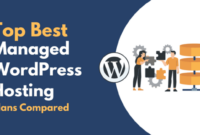Web hosting for beginners takes center stage as we delve into the essential aspects of setting up your first website. Whether you’re new to the online world or looking to expand your digital presence, understanding the fundamentals of web hosting is crucial.
In this guide, we will explore the key considerations, types of hosting, and security measures to ensure a seamless and secure online presence for beginners.
Introduction to Web Hosting for Beginners
Web hosting is a service that allows individuals and organizations to make their websites accessible via the World Wide Web. It is an essential component for anyone looking to establish an online presence, whether for personal blogs, e-commerce sites, or business websites. Choosing the right web hosting service is crucial for beginners to ensure their websites are secure, reliable, and perform well.
Popular Web Hosting Services for Beginners
- Bluehost: Known for its user-friendly interface and affordable pricing, Bluehost is a popular choice for beginners.
- SiteGround: SiteGround offers excellent customer support and fast loading times, making it ideal for those new to web hosting.
- HostGator: With a range of hosting plans to choose from, HostGator is suitable for beginners looking for scalability.
Basic Features to Look for in a Web Hosting Service
- Reliability: Ensure the web hosting service guarantees a high uptime percentage to keep your website accessible at all times.
- Security: Look for features such as SSL certificates, regular backups, and malware protection to keep your website secure.
- Customer Support: Opt for a web hosting service that offers 24/7 customer support through various channels like live chat, phone, or email.
- Scalability: As your website grows, you may need to upgrade your hosting plan, so choose a service that allows for easy scalability.
Types of Web Hosting
When it comes to web hosting, there are several types to choose from based on your website’s needs. It’s essential to understand the differences between shared, VPS, dedicated, and cloud hosting to make an informed decision as a beginner.
Shared Hosting
Shared hosting is like renting a small part of a server where multiple websites are hosted. It is the most affordable option, making it suitable for beginners on a budget. However, since resources are shared, performance can be affected if other sites on the server experience high traffic.
VPS Hosting
VPS (Virtual Private Server) hosting provides a more stable and secure environment compared to shared hosting. It offers dedicated resources to your website within a shared server. This type is suitable for websites that have outgrown shared hosting but are not ready for a dedicated server.
Dedicated Hosting
Dedicated hosting involves having an entire server dedicated solely to your website. This type of hosting provides the highest level of control, security, and performance. It is ideal for websites with high traffic, resource-intensive applications, or specific security requirements.
Cloud Hosting
Cloud hosting utilizes multiple virtual servers to host websites, making it highly scalable and reliable. Websites on cloud hosting can easily handle traffic spikes and have better uptime. This type of hosting is suitable for websites with unpredictable traffic patterns or growing businesses.
Factors to Consider When Choosing Web Hosting: Web Hosting For Beginners

When choosing a web hosting service as a beginner, there are several key factors to consider to ensure you select the right provider for your needs.
Importance of Uptime, Bandwidth, Storage, and Support
- Uptime: This refers to the amount of time your website is up and running without any interruptions. It is crucial to choose a web host with a high uptime guarantee to ensure your website is always accessible to visitors.
- Bandwidth: Bandwidth determines how much data can be transferred to and from your website. It is essential to have enough bandwidth to accommodate your website’s traffic without experiencing slow loading times or downtime.
- Storage: The amount of storage provided by a web host will determine how much content you can store on your website. Make sure to choose a hosting plan with sufficient storage space for your needs.
- Support: Reliable customer support is crucial, especially for beginners who may encounter technical issues or have questions about their hosting service. Look for a web host that offers 24/7 support through various channels such as live chat, phone, and email.
Pricing Structures and Awareness for Beginners
- When considering pricing structures, it is important to understand the different types of hosting plans available, such as shared hosting, VPS hosting, and dedicated hosting. Each plan comes with its own price point and features, so beginners should carefully evaluate their needs before selecting a plan.
- Beware of hidden fees or renewal costs that may not be clearly stated upfront. Some web hosting providers offer low introductory rates but increase prices upon renewal, so be sure to read the fine print before committing to a plan.
- Consider the scalability of your hosting plan, as you may need to upgrade to a higher tier as your website grows. Look for providers that offer easy scalability options to accommodate your website’s growth.
Comparison of Hosting Providers for Beginners
- When comparing hosting providers, look for beginner-friendly features such as user-friendly control panels, one-click installations for popular CMS platforms like WordPress, and website builder tools.
- Consider the reputation and reliability of the hosting provider by reading reviews and testimonials from other users. Look for providers with a strong track record of uptime, security, and customer support.
- Evaluate the included features and resources offered by each hosting provider, such as SSL certificates, backups, and domain registration. Choose a provider that offers the features you need to run your website effectively.
Setting Up a Website with Web Hosting

Setting up a website with web hosting is an essential step in establishing your online presence. Below is a step-by-step guide for beginners on how to set up a website with their chosen web hosting service.
Domain Registration
When setting up a website, the first step is to register a domain name. Follow these steps to register your domain and connect it to your hosting account:
- Choose a domain registrar: Select a reputable domain registrar to register your desired domain name.
- Search for a domain: Check the availability of your preferred domain name and select the extension (.com, .net, .org, etc.).
- Register the domain: Follow the registrar’s instructions to complete the registration process and make the necessary payments.
- Connect the domain to hosting: Access your hosting account and update the domain settings to connect it to your hosting service.
Website Builders and CMS Platforms
There are several website builders and content management systems (CMS) that are beginner-friendly and compatible with various web hosting services. Consider using platforms like:
- WordPress: A popular CMS that offers flexibility, customization options, and a vast library of plugins and themes.
- Squarespace: A user-friendly website builder with drag-and-drop features and professional templates for easy website creation.
- Wix: Another intuitive website builder that allows users to create visually appealing websites without coding knowledge.
Security Measures for Beginner Web Hosting

When it comes to beginner web hosting, security is a crucial aspect that should not be overlooked. Identifying common security risks and implementing necessary measures can help protect your website from potential threats.
Common Security Risks
- Brute force attacks: Hackers attempt to gain access to your website by trying multiple username and password combinations.
- Malware injections: Malicious code can be injected into your website, compromising its security and integrity.
- DDoS attacks: Distributed Denial of Service attacks can overwhelm your server, causing your website to become inaccessible.
Tips for Securing Your Website, Web hosting for beginners
- Use strong passwords: Ensure that your passwords are complex and unique to prevent unauthorized access.
- Install security plugins: Implement security plugins on your website to detect and prevent security threats.
- Keep software updated: Regularly update your website’s software to patch vulnerabilities and protect against exploits.
- Backup your website: Create regular backups of your website to restore it in case of a security breach.
Importance of SSL Certificates
SSL certificates encrypt data transmitted between your website and its visitors, ensuring secure communication and protecting sensitive information.
Importance of Backups
Backups are essential for restoring your website to a previous state in case of data loss or security breaches, providing a safety net for your website.
Importance of Software Updates
Regular software updates help protect your website from security vulnerabilities and ensure that your website is equipped with the latest security features.
In conclusion, mastering the basics of web hosting is the first step towards establishing a successful online presence. By choosing the right hosting provider and implementing essential security measures, beginners can embark on their digital journey with confidence.
When it comes to data predictions, utilizing AWS AI can truly unleash the power of predictive analytics. By harnessing the capabilities of artificial intelligence within the Amazon Web Services ecosystem, businesses can make more accurate forecasts and decisions based on data insights. To learn more about how AWS AI can revolutionize predictive analytics, check out this comprehensive guide on Data predictions using AWS AI Unleashing the Power of Predictive Analytics.
In the realm of machine learning tools, AWS SageMaker and TensorFlow stand out as two powerful contenders. Both platforms offer unique features and strengths, making it essential for businesses to understand their differences. To delve deeper into the comparison between AWS SageMaker and TensorFlow, explore this detailed analysis on AWS SageMaker vs TensorFlow A Comparison of Two Powerful Machine Learning Tools.
For handling time-series data, Amazon Forecast provides a robust solution for unlocking the power of predictive analytics. By utilizing advanced forecasting techniques, businesses can gain valuable insights into future trends and patterns. To explore the capabilities of Amazon Forecast in depth, check out this informative article on Amazon Forecast for time-series data Unlocking the Power of Predictive Analytics.



